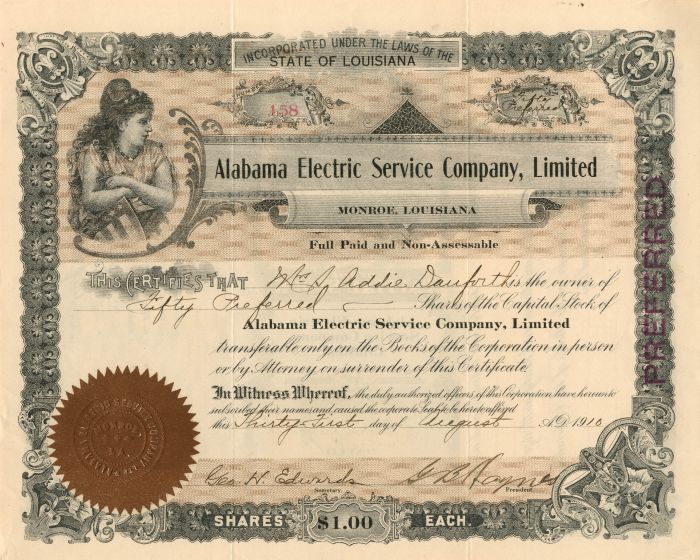Alabama Electric Service Co., Limited - Stock Certificate
Inv# US1075 Stock
Monroe (historically French: Poste-du-Ouachita) is the eighth-largest city in the U.S. state of Louisiana, and parish seat of Ouachita Parish. With a 2020 census-tabulated population of 47,702, it is the principal city of the Monroe metropolitan statistical area, the second-largest metropolitan area in North Louisiana.
The settlement formerly known as Fort Miro adopted the name Monroe, during the first half of the 19th century, in recognition of the steam-powered paddle-wheeler James Monroe. The arrival of the ship had a profound effect on the settlers; it was the single event, in the minds of local residents, that transformed the outpost into a town. The ship is depicted in a mural at the main branch of the Monroe Library on North 18th Street. Credit is indirectly given to James Monroe of Virginia, the fifth President of the United States, for whom the ship was named.
During the American Civil War, Monroe and Opelousas, the seat of St. Landry Parish in southern Louisiana, had Confederate training camps. They were established after the fall of New Orleans to the Union in 1862. Conscripts were soon sent to both camps. In 1862, Monroe and Delhi in Richland Parish became overcrowded with unwelcome refugees from rural areas to the east.
They had fled the forces of Union General U.S. Grant, who moved into northeastern Louisiana and spent the winter of 1862–1863 at Winter Quarters south of Newellton in Tensas Parish. He was preparing for the siege of Vicksburg, Mississippi, not completed until July 4, 1863. Historian John D. Winters reported "strong Union sympathy" in both Delhi and Monroe. As the refugees moved farther west toward Minden in Webster Parish, many of the residents, themselves very poor, refused to sell them food or shelter and treated them with contempt.
Union boats came up the Ouachita River to Monroe to trade coffee, liquor, dry goods, and money for cotton. "Confederate officers were accused by a citizen of encouraging the trade and of fraternizing with the enemy, eating their oysters, and drinking their liquor." As the war continued, deserters and stragglers about Monroe became "so plentiful that the Union Army sent a special detachment" from Alexandria to apprehend them. In 1913, Joseph A. Biedenharn, the first bottler of Coca-Cola, moved to Monroe from Vicksburg, Mississippi. Until Biedenharn's breakthrough, Coca-Cola had been available only when individually mixed at the soda fountain. Biedenharn and his son Malcolm were among the founders of Delta Air Lines, originally Delta Dusters. That company was founded in Tallulah, Louisiana in Madison Parish. It was based on products and processes developed by the Agriculture Experimental Station to dust crops from airplanes in order to combat the boll weevil, which was destroying cotton crops.
Biedenharn's home and gardens at 2006 Riverside Drive in Monroe have been preserved and are now operated as the Biedenharn Museum and Gardens and are open to the public. Collett E. Woolman, the Ouachita Parish agent, was originally from Indiana. He pioneered crop dusting to eradicate the boll weevil, which destroyed cotton throughout the Mississippi River delta country in the early 20th century. Woolman originated the first crop-dusting service in the world. The collapse of cotton production meant a widespread loss of farm jobs. This contributed to the Great Migration of the early 20th century, when a total of 1.5 million African Americans left the rural South for jobs in northern and midwestern cities. They were also escaping the oppressive racial conditions and violence under Jim Crow and the disenfranchisement that excluded most blacks from the political system.
Howard D. Griffin (1911-1986) purchased a boat dealership in 1936 while he was a student at what became the University of Louisiana at Monroe. By the 1960s, Griffin's company had become the largest outboard motor dealership in the world. He also sold motorcycles. From 1955 to 1985, Griffin and his wife, Birdie M. Griffin (1915-1985), operated their seasonal Land O' Toys store on South Grand Street in Monroe. The motto was "Land O' Toys; Loads of fun for girls and boys; Bring the kids and look around; The biggest toy deal in the town." Once Christmas was over, the toy store was quickly phased out, and the outboard motors returned to the showroom. From her childhood memories, Sherry Lynn Mason recalls the Land O' Toys:
"I loved that store. Every time [my father] took me there, we were waiting for his outboard motor to be fixed across the street. It was a magical place to me!" Amy Berry Baker recalls, "It wasn't Christmas until we went to Howard Griffin ... magical for kids," according to an article in The Monroe News-Star.
Mrs. Griffin died December 15, 1985, and the store closed permanently a few days after Christmas of that year. In March 2011, the remaining abandoned building burned. All that remains are the memories of the former customers, now all adults. Cheri Chadduck recalled, "Memories are completely magical, and I am so grateful for my childhood recollections of time there."
A stock certificate is issued by businesses, usually companies. A stock is part of the permanent finance of a business. Normally, they are never repaid, and the investor can recover his/her money only by selling to another investor. Most stocks, or also called shares, earn dividends, at the business's discretion, depending on how well it has traded. A stockholder or shareholder is a part-owner of the business that issued the stock certificates.











Ebay ID: labarre_galleries